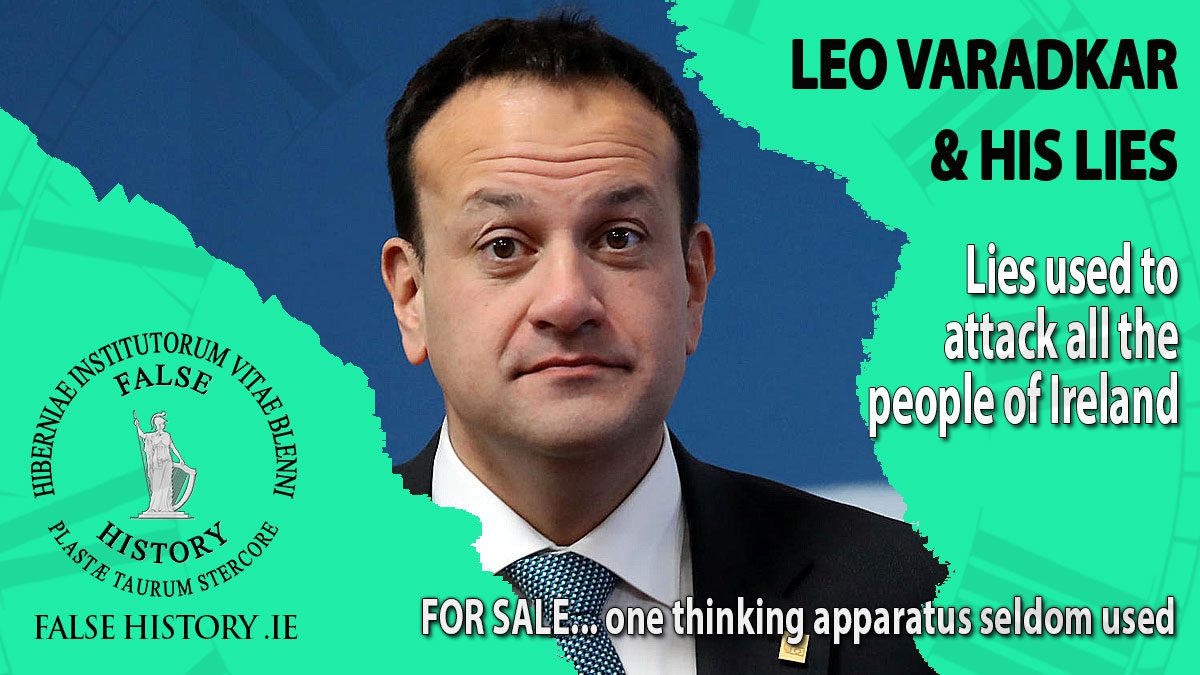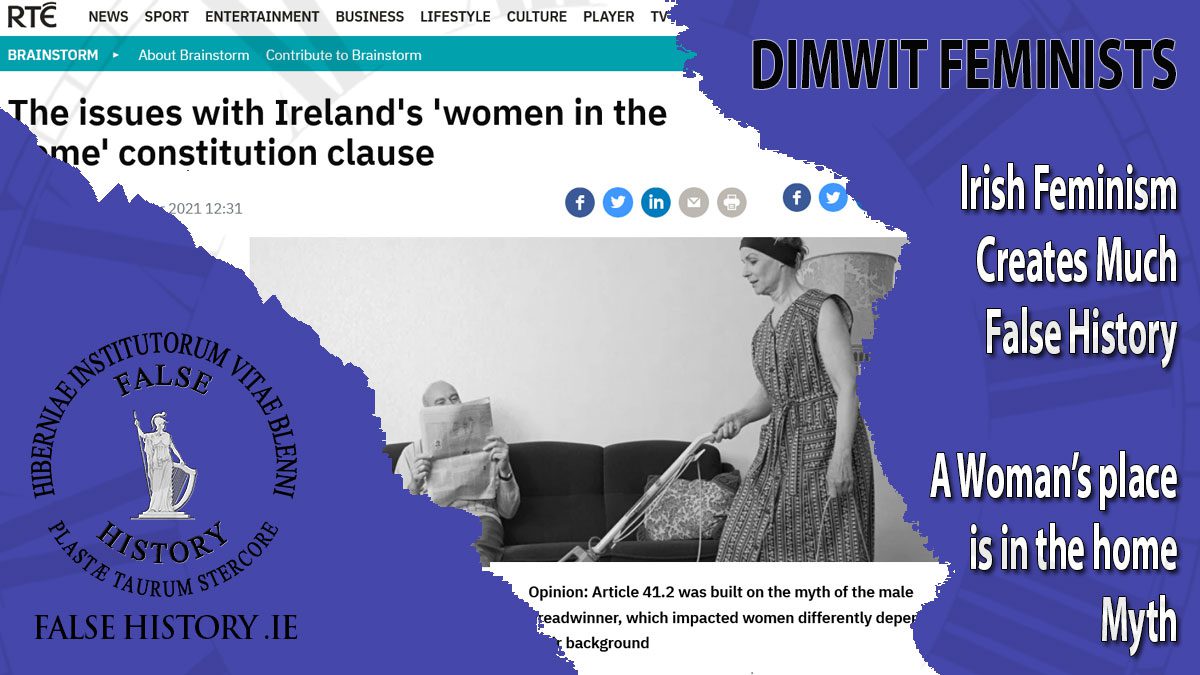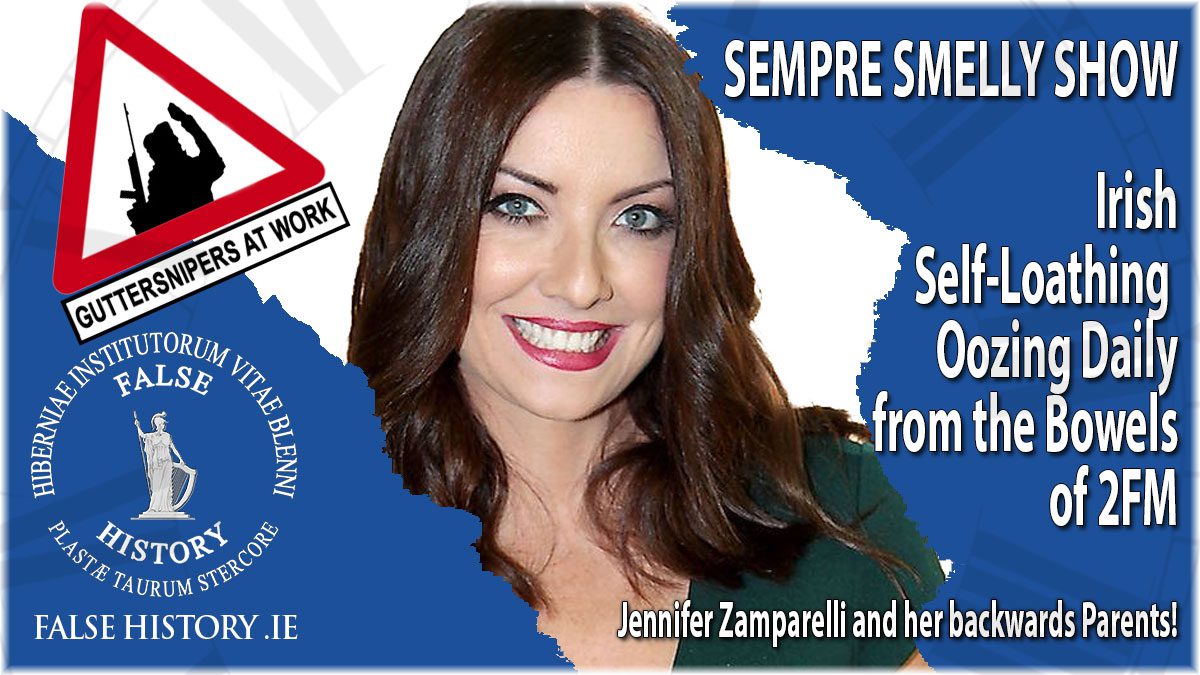Leo’s Varadkar’s apology following the publication of the final report of the commission of investigation into mother and baby homes proved once and for all that even those who are qualified as a medical doctor can be quite unintelligent. It would appear that Varadkar never bothered reading the final report, choosing instead to repeat the horse manure which appeared with alacrity in the Irish press and elsewhere.
Leo Varadkar is a gaff prone politician, a former and future Prime Minister (Taoiseach) of Ireland.[1] He currently holds the position of Táinste or Deputy Prime Minister. He is a former medical doctor and many people— including me — regarded Leo Varadkar as intelligent, even though on many occasions in the past, it appeared he could not be bothered using it. I was wrong, dead wrong.
In his apology Leo declared ‘this report shames Irish society entirely,’ claiming that ‘a conspiracy of shame and silence and cruelty’ helped to create a ‘stifling, oppressive and deeply misogynistic culture’.[2] All these statements are untrue and not contained within the report. Leo incorporated so many gaffs that it would take many pages to list and explain them. Accordingly, I will cite a few examples which will suffice to illustrate the point.
Leo: ‘It must not be forgotten that illegitimacy was not a social prejudice but the law of the land, a law passed in the House in 1931 by our forebears.’[3] Dead wrong again. The Legitimacy Act, 1931 allowed the status of illegitimate children to be legitimised.[4] Common Law or British law — for centuries —discriminated against illegitimate children to protect the inheritance rights of the children of an official marriage. It is a biological fact that knicker elastic loses its properties around rich and powerful men. Kings, Counts, Viscounts, Lords and most of the full gamut of the male elite, had mistresses or conducted extra martial affairs with members of the opposite sex and the same sex. Those of the heterosexual variety resulted in the birth of many children and these children were denied the right to inherit from their father.
Sometimes however, the father recognised or acknowledged his parentage thus giving his child some inheritance rights and on occasion that could amount to full inheritance. In the case of royalty, full rights were seldom granted but many recognised children got titles, elevating their social status, but seldom were they elevated to the full status of royalty. William I of England was officially known as William the Bastard, the surname was not an insult then like it is today.
The surname Fitzroy literally translates as ‘son of the king’ and one of the illegitimate sons of Henry VIII was acknowledged by him and named Henry FitzRoy. He was given the title of Duke of Richmond and Somerset.[5] He was the older half-brother of Queen Elizabeth I and had his birth status been legitimate, he would have been King of England.
The laws on illegitimacy are deeply engrained in British law and have existed for centuries. It is extraordinary that a seemingly educated man like Varadkar is steadfastly unaware of the basic facts of history.
The concept of illegitimacy did not start in 1931 and the Irish law was written — as many are today, with intellectual laziness — copied from a British law of 1926. Had Leo bothered to look up the Irish statute book, he might have noticed that the 1931 Act set out to modify the ‘Legitimacy Declaration Act of 1868’, introduced when Ireland was ruled directly from Britain. That reveals yet another buffoonish gaff when Leo went on to state that the 1931 law was ‘very much guided by the Catholic social teaching of the day’. Really! Using Leo’s brand of logic, responsibility must lie with protestant social teaching, as the British establishment have a centuries old culture which is hostile and anti-Catholic. There is no chance in hell that the British would introduce laws based on Catholic social teaching.
It is a lie to suggest that illegitimacy was enshrined in law by the Irish in 1931. It is a lie to suggest that the Act was based on Catholic social teaching. Stirring up hatred of Catholics using lies would be a hate crime in most functioning democracies.
Leo also declared us that the report shows that Ireland had a ‘deeply misogynistic culture’. However, that again is a lie misrepresenting the report and ignoring totally the stories of former residents who were complimentary of their treatment. The commission’s final report contains only one mention of the word ‘misogyny’ and this is a repeat of a lie fabricated by feminist historian, Lindsay Earner-Byrne. She claimed that the Minister of Justice James Fitzgerald Kenney ‘presented a disturbingly misogynistic approach to welfare’, presenting the unmarried mother as ‘temptress and blackmailer’.[6][7] In actual fact the parliamentary debate from 1930 was a philogynistic attempt to give unmarried mothers the right to claim financial maintenance from the putative father. The comments relating to ‘temptress and blackmailer’ were addressing issues surrounding how the law could be abused by such persons, and what safeguards could be built into the law. There was absolutely no hint in his comments that he was applying a pejorative label to all unmarried mothers. Earner-Byrne’s lie was never checked for veracity by the commission and others and is indicative of poor-quality analysis and poor university educational standards which currently pervades through Irish society.
In reality Irish society was philogynous — it loved and respected women — it gave them rights and protected them; rights men did not enjoy. Unlike in the United Kingdom, women got the vote on the same basis as men, were constitutionally protected from being forced by poverty to do work harmful to their health, which they were forced to do under British rule. It gave women the right to opt out of jury service and much more.
In another part, Varadkar broadcasts to the nation that children who were in mother and baby homes and those who were fostered out that ‘their education [was] unimportant’. Leo obviously has no memory of the ‘truancy Garda’, a policeman or policewoman tasked with finding children who were frequently absent from school.[8] Hundreds if not thousands of parents and guardians found themselves before the courts to explain such absences. Many received fines or were imprisoned. Leo of course never looked up the law to find the School Attendance Act, 1926,[9] nor did he read the part of the commission report which stated that only the Tuam Children’s Home kept children of school going age and all those who were fit to attend school, did so.
Leo’s laziness is abundantly evident in his apology, it suggests that he never read the final report of the commission — three thousand pages is hard enough to get through, even harder when it is full of complex history. He may have read parts, but he managed to miss entirely, all the evidence which would have contradicted his prejudices. His expectation to get away with lies and misrepresentation suggests that he likes to rev the engine to make noise, but he doesn’t bother to press the clutch pedal to put his brain into first gear.
Albert Einstein is quoted as saying that; ‘few people are capable of expressing with equanimity opinions which differ from the prejudices of their social environment. Most people are incapable of forming such opinions.’ The Irish parliamentary system is not currently blessed with even a few people with such basic capabilities and Leo stands as the very exemplar.
People from Dublin, like Leo are called Jackeens, short for Union Jackeen. The slang term is taken from the British flag and is indicative of a culture within sections of Irish society which has a sneering contempt for all things Irish. The attitude is still today pervasive in Dublin society and elsewhere in the country. West Brits and Shoneens are among the other terms, our ancestors used for Irish people who are overly enamoured by the British, who they see as their superiors. It is a mechanism of illusory social climbing achieved by creating a psychological and snobbish affinity with their colonial masters — adopting their racial prejudices — to denigrate their fellow Irish citizens. Putting people down elevates the denigrator and creates a false sense of superiority. Superior beings assume themselves to have the right to sneer at their fellow Irish people — ‘self-loathing’ is the term often used by social researchers today. It is so deeply engrained in society that it often goes unrecognised, which is perhaps just a well for those on the receiving end.
When Leo sneered at the entire Irish nation, his opinion was nothing more than a mindless expression of the prejudices of his social environment. However, using lies which are easily disprovable to back up his sneer, shows that if he has innate intelligence, he is fearful of expending energy by using it. Moreover, he is completely ignorant of Irish history and so empowers the barstool leprechauns to install their false history in the vast empty space between his ears.
There is no shame on Irish society other than to have elected a parliament of dolts, who have not got the wit nor the inclination to acquire a half decent standard education. A parliament full of liars like Leo Varadkar who have no interest in the truth, nor have they the interests of the people at heart.
The international financial crash of 2008 caused Ireland to suffer from a political inversion — a phenomenon where the dumbest in society rise to the top.
EJ
Footnotes
[1] As part of the coalition deal, Micheál Martin steps down and Leo Varadkar takes over as Taoiseach on 15 December 2022
[2] Oireachtas, ‘Report of the Commission of Investigation into Mother and Baby Homes’.
[3] Ibid.
[4] Government of Ireland, Legitimacy Act, 1931.
[5] Beauclerk-Dewar and Powell, Royal Bastards.
[6] Commission of Investigation, ‘Mother and Baby Homes Commission of Investigation Final Report’ § 9.96.
[7] Oireachtas, ‘Affiliation Orders Bill, 1929’.
[8] O’Connor, ‘Truancy Officer System Is “Not Properly Funded”’.
[9] Government of Ireland, School Attendance Act, 1926.
References
Beauclerk-Dewar, Peter, and Roger Powell. Royal Bastards: Illegitimate Children of the British Royal Family. The History Press, 2011.
Commission of Investigation. ‘Mother and Baby Homes Commission of Investigation Final Report’. Irish Government, 30 October 2020.
Government of Ireland. Legitimacy Act, 1931, Pub. L. No. Number 13 of 1931 (1931). https://www.irishstatutebook.ie/eli/1931/act/13/enacted/en/print.html.
———. School Attendance Act, 1926, Pub. L. No. Number 17 of 1926 (1926). https://www.irishstatutebook.ie/eli/1926/act/17/enacted/en/.
O’Connor, Alison. ‘Truancy Officer System Is “Not Properly Funded”’. Irish Independent. 26 August 2003. https://www.independent.ie/irish-news/truancy-officer-system-is-not-properly-funded-25936219.html.
Oireachtas, Houses of the. ‘Dáil Éireann Debate – Vol. 35 No. 7 Illegitimate Children (Affiliation Orders) Bill, 1929—From the Seanad. – Seanad Amendments’. Tithe an Oireachtais, 11 June 1930. https://www.oireachtas.ie/en/debates/debate/dail/1930-06-11/30/.
———. ‘Dáil Éireann Debate – Vol. 1003 No. 1’. Tithe an Oireachtais, 13 January 2021. https://www.oireachtas.ie/en/debates/debate/dail/2021-01-13/10.




